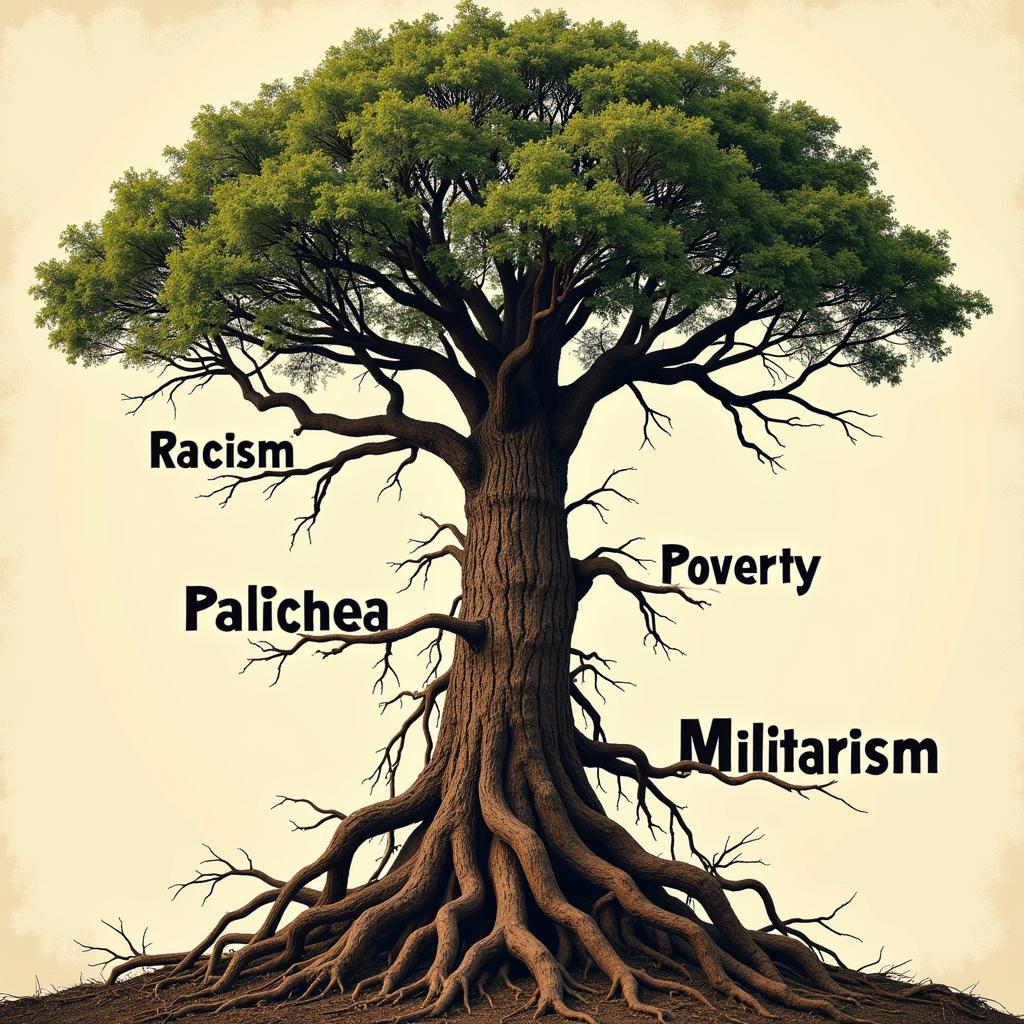The Three Evils Of Society, a concept popularized by Martin Luther King Jr., encompass the interconnected challenges of racism, poverty, and militarism. These pervasive issues continue to plague societies globally, hindering progress towards a more just and peaceful world. Understanding their roots and their impact on individuals and communities is crucial for developing effective solutions. martin luther king the three evils of society
Understanding the Roots of the Three Evils
Racism, the first of the three evils, is a systemic issue deeply ingrained in societal structures. It manifests in discrimination, prejudice, and unequal opportunities based on race. Poverty, the second evil, often stems from systemic inequalities and lack of access to resources, perpetuating a cycle of disadvantage across generations. Militarism, the third evil, prioritizes military solutions and spending over social programs and diplomatic efforts, diverting valuable resources and exacerbating global conflicts.
What are the long-term consequences of these societal ills? The effects ripple through communities, creating instability and hindering development. Racism fuels social division and marginalization. Poverty limits access to education, healthcare, and economic opportunities. Militarism diverts resources from essential social services and perpetuates a culture of violence.
 The Roots of Societal Evils: Racism, Poverty, and Militarism
The Roots of Societal Evils: Racism, Poverty, and Militarism
Addressing the Three Evils: A Call to Action
How can we combat these interconnected challenges? Addressing the three evils requires a multi-pronged approach involving individual action, community engagement, and policy changes. Promoting education and awareness about the root causes of these issues is crucial. Advocating for policies that address systemic inequalities and promote social justice is essential. Supporting organizations working to alleviate poverty and promote peace is another vital step.
What is the role of individuals in this fight? Individual actions, while seemingly small, can collectively contribute to significant change. Challenging discriminatory attitudes and behaviors in our daily lives is a powerful first step. Supporting businesses and organizations that prioritize ethical practices and social responsibility is another important action. Educating ourselves and others about the interconnectedness of these issues is crucial for fostering a more informed and engaged citizenry.
Building a More Just and Peaceful Future
Overcoming the three evils requires a sustained commitment to building a more equitable and peaceful world. By working together, we can create societies where everyone has the opportunity to thrive, free from the shackles of racism, poverty, and the threat of violence.
“We must recognize that the three evils are interconnected and address them simultaneously if we are to build a truly just and peaceful world,” says Dr. Anya Sharma, a leading sociologist specializing in social justice movements. “This requires a fundamental shift in our values and priorities, moving away from a culture of fear and division towards one of empathy and cooperation.”
martin luther king three evils of society
Addressing the three evils of society – racism, poverty, and militarism – is an ongoing struggle, but one that is essential for creating a better future for all. It is a call to action for individuals, communities, and governments to work together to dismantle these systemic issues and build a world rooted in justice, equality, and peace.
Conclusion
The three evils of society continue to pose significant challenges to building a more just and equitable world. By understanding their interconnected nature and working collaboratively to address their root causes, we can create a more peaceful and prosperous future for all. armed forces and society
FAQ
- What are the three evils of society as defined by Martin Luther King Jr.?
- How are racism, poverty, and militarism interconnected?
- What are some practical steps individuals can take to address these issues?
- What role do governments play in combating the three evils?
- What are some examples of successful initiatives aimed at promoting social justice and peace?
- How can we measure progress in addressing these complex challenges?
- What are the potential long-term benefits of overcoming the three evils?
More Resources
- What are some other articles about building peace?
- Where can I find organizations working to combat poverty?
- Are there any resources available for learning more about the impact of militarism?
Need support? Contact us 24/7: Phone: 02043854663, Email: [email protected], or visit us at Zone 34, Bac Giang, 260000, Vietnam.